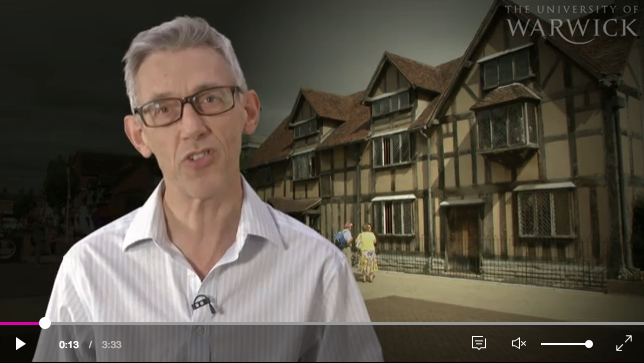Me and my MOOC, part 1

I have come to the end of the first week of my MOOC. Having taken an assessment test and scored 34 from a possible 36 points (and with one of those I dropped being highly questionable), I’m feeling sufficiently pleased to share my experiences. Indeed I think I might chronicle my progress here on occasions across the next nine weeks. For those of you just arrived from Mars, a MOOC is a massive open online course, a relatively new kind of distance learning in which you particpate with lots and lots of other people. My MOOC has been put together by Futurelearn, a private company owned by The Open University, in partnership with The University of Warwick and the Shakespeare Birthplace Trust in Stratford-upon-Avon. The subject is ‘Shakespeare and his world’ and the tutor is the estimable Professor Jonathan Bate, Provost of Worcester College, Oxford, and author of one of the very best books on the Bard, The Genius of Shakespeare. Oh, and it’s completely free – you can sign up here.
In one of the introductory videos, Jonathan Bate (above) explains that the course is concerned with the connections between ‘the reality of [Shakespeare’s] world and the words of his plays’. As a consequence, central to the course are objects from the collection of the Shakespeare Birthplace Trust. A number of these feature in the videos, including a gold seal ring discovered in the early nineteenth century, which might just possibly have belonged to Shakespeare, and a folio edition of Ben Jonson’s plays. The latter is used in a thoughtful discussion of the collaborative nature of authorship in early modern London, which for me was the richest component of the first week’s offerings.
During the week I have watched ten short videos, each between around 4 minutes and 12 minutes in length; I have read some short and undemanding texts online; I have perused the discussion components of the course, but not felt motivated to contribute; and I have read Shakespeare’s 1593 Venus and Adonis. I have enjoyed the videos, but there’s no question that the highlight has been reading a text that I thought I knew, at least to a degree, but which – with a little concentration in two long sessions – has proved to be a great and glorious experience. It’s funny and sexy and involving and moving and all-round marvellous.
In later weeks the recommended texts apparently have a closer relationship with the topics under discussion, but in Week 1 Venus and Adonis featured but glancingly in a consideration of aristocratic patronage. I expected – and indeed would have liked – more attention to be paid to the text. Next week The Merry Wives of Windsor is our way in to the world of Stratford in Shakespeare’s day and the content may get a little more challenging. So far the experience has been comparable to watching chunks of a not-too-demanding BBC Four documentary with exceptionally modest production values – the films essentially have Jonathan Bate talking direct-to-camera with just an occasional cutaway. But I like the very clear lay-out of the online page and the structure of the various elements, and it has unquestionably kept my interest. On, then, to The Merry Wives…
Leave a Reply